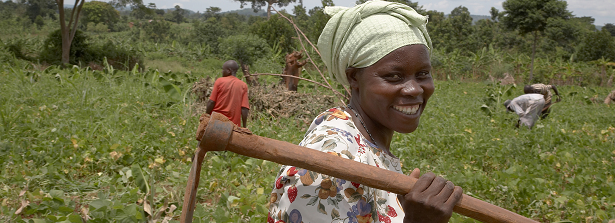Nine new projects awarded in third call round 2 Applied Research Fund (ARF)

Nine new projects under the second round of the third call of the Food & Business Applied Research Fund (ARF) have received funding from NWO-WOTRO. The new ARF projects will start in the next few months and will take up to three years. All research teams are led by a practitioner organization from one of the fifteen partner countries of Dutch development cooperation. Other team members are Dutch or LMIC research or higher education organizations and, in some cases, also other local enterprises.
Nine awarded projects second round ARF-3
The focus of the third call relates to the new Dutch food security policy. The projects are related to one of the following pillars:
- Eradicating existing hunger and malnutrition. (‘people’)
- Promoting inclusive and sustainable growth in the agricultural sector. (‘profit’)
- Creating ecologically sustainable food systems. (‘planet’)
Research proposals also need to invest in the enabling business and policy environment at least at the local level. Bottlenecks at the more systemic level often hamper scaling, application and/or innovation potential.
Please find below a short description of the nine awarded projects: on the ARF Research Pages you can find more detailed information on each project.
Diffusion of promising plantain varieties in Benin
The project aims at promoting intensive plantain production and processing to ensure food security and generate income to practitioners. Actors in the banana value chain including practitioners, as well as scientists will come together to select promising plantain varieties and produce healthy planting material. In addition, they will establish four poles of diffusion to ensure a successful dissemination of plantain varieties; while enhancing the marketing of plantain-derived products delivered through appropriate processing technologies and packaging.
Bangladesh Mangrove Polders for Shrimp Aquatic Productivity
Bangladesh constructed polders for boosting rice production but subsequent saline water logging compelled farmers to replace rice with shrimp. Mangrove-Polders aims to enhance shrimp productivity through innovations in land-use planning, water management and planting mangrove trees along the polder canals. Mangroves improve water quality, sequester carbon, provide habitat for aquatic animals, trap sediments, and contribute to coastal protection. This building-with-nature approach aims to positively impact on food security and livelihoods of coastal shrimp farming communities.
Promoting dye sorghum cultivation in Benin
Dye sorghum varieties have the distinct advantages to produce leaf sheaths rich in bio-colorants, while producing at the same time grain. The promotion of dye sorghum cultivation will raise incomes through bio-colorants sales while enabling retention of grain for food security. The present project will optimize the cultivation practices of dye sorghum and develop methods for bio-colorants extraction and grain processing into foods. Guidelines for quality management in the leaf sheaths supply chain will be developed.
Economically viable foundation seed model for Mali
Availing stocks of foundation seed in adequate quantities is desperately needed in Mali for farmers to reap the benefits of sowing certified seed. This project will bring together extension and advisory services, researchers, farmers, and seed companies to test foundation seed production models for efficacy, effectiveness, sustainability, profitability and seed quality. The best model will be promoted and farmers’ capacity in seed production and commercialization strengthened, for increased crop production and productivity.
Enhancing Kersting’s groundnut production-marketability in Benin
The cultivation of Kersting’s groundnut, is constrained by poor agronomic practices and lack of quality seeds leading to low yield and poor quality products. To cope with these challenges, this three-year project was developed. Following a science-based value chain approach, the complementary expertise of the consortium members will be leveraged to select farmers and consumers preferred varieties and deliver quality seeds. Doing so, the project is expected to improve farmers’ incomes and processors’ productivity.
Enhancing safety and quality of milk in Ethiopia
This project aims to implement and embed the best practices for producing healthy milk in Ethiopia. It combines experience in community based breeding systems to develop a more resilient cow, the use of medicinal herbs for reduction of the use of antibiotics, education of women farmers to tend herbal gardens, and strengthening the capacity for milk quality control. Knowledge is achieved and sustained through interaction between farmers, scientists and government from Ethiopia, Netherlands and India.
Safe and accessible greenhouse production of (fruit) vegetables in Ghana (Fresh Green Ghana)
Ghana knows temporal shortage of fresh (fruit) vegetables, leading to high prices for the poor and under-consumption. Also the use of pesticides and poor post-harvest hygiene causes concern. Protected horticulture enables economically and environmentally sustainable production through more and cheaper vegetables, generation of employment, and through the lower use of chemical crop protection agents. The project intends to achieve improvement of protected horticulture through data sharing and technology improvement in collaboration with growers.
Rainwater harvesting from roads for indigenous pasture production and improved rural livelihoods in semi-arid Kitui, Kenya (ROFIP)
Livestock keeping is a way of life among communities inhabiting African drylands. However factors such as inadequate quantity and quality of pasture, due to land degradation, climate variability and change, are threatening the livelihoods of many pastoral communities. Therefore, there is need to cushion these communities against such vagaries of nature. This project integrates rainwater harvesting from roads and grass reseeding for improved pasture production and rural livelihoods in a typical semi-arid environment in Africa.
Commercial Seed System for African indigenous Vegetables in Uganda
Solanacea leafy vegetable is one of African Indigenous Vegetables with high nutritive value. Its production and profitable trade is hamstrung by limited access to quality seeds .Seed multiplication offers huge opportunities for women and youth farmers that are traditionally growers of vegetables. This project is designed to benefit 50 farmer groups through increased interaction between vegetable seed value chain actors namely; farmers, traders, seed inspectors and researchers.





